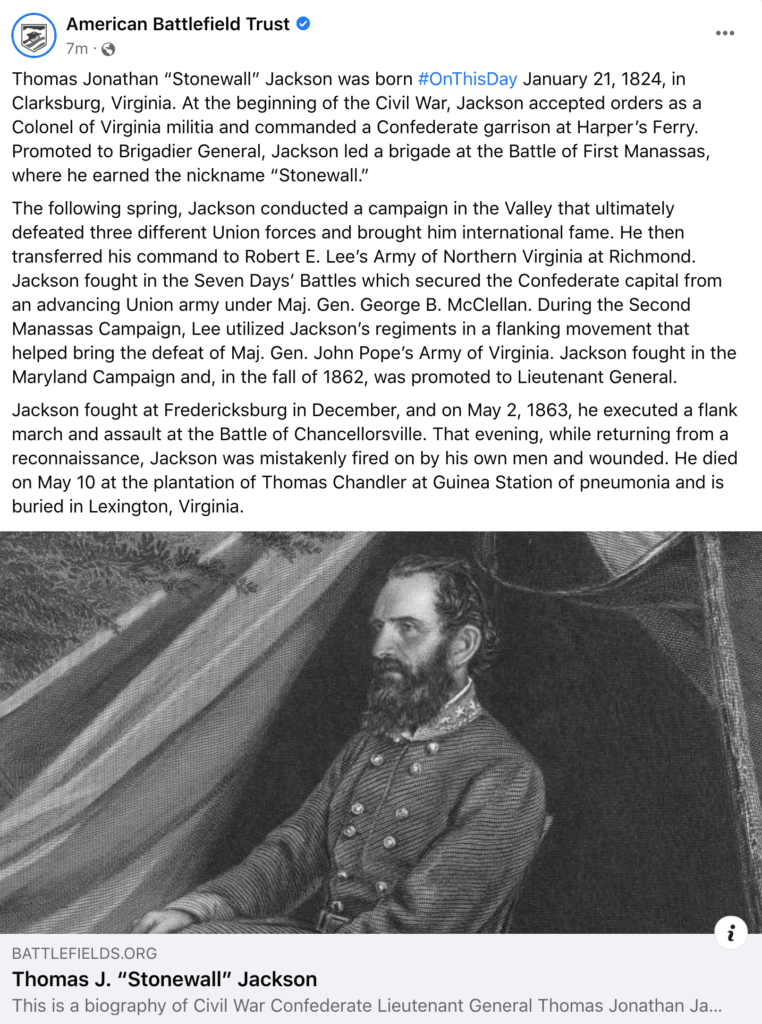I think if you are going to recognize the birthday of someone like “Stonewall” Jackson–even in something as simple as a social media post–you have an obligation to tell the full story. Jackson’s military exploits, including his flanking maneuvers, must be understood alongside the fact that he owned human beings, chose to make war against the United States of America, and ultimately gave his life in a cause to create an independent slaveholding nation that was committed to both protecting and expanding slavery.
Only then do you have a more honest and more complete picture of the man.
 One of the reasons why I support battlefield preservation is because they help us to tell this story.
One of the reasons why I support battlefield preservation is because they help us to tell this story.
One correction: in the last paragraph of my post it should read “…for a nation that was committed…”
While I’m certainly glad the Union won the Civil War, and agree that slavery was a horrible injustice, I have serious problems with your argument here. The points you make, while true as far as they go, don’t make Jackson stand out from his fellow Confederates. Points 2 and 3 could be made about ANY Confederate, and point 1 about a large portion of Confederates (and a non-negligible number of Unionists as well, by the way). Jackson’s military career and exploits, on the other hand, DO distinguish him. They’re the sole reason we remember him today. If it weren’t for them–if Jackson had been some anonymous Confederate private–the Trust wouldn’t have made a post about him at all (at least unless he was chosen as an example of an ordinary soldier).
If your response is that in discussing any Confederate, even in a brief social media post, one has an obligation to mention the points you’ve made–well, I disagree with that. It seems like POV-pushing to me (to use a term commonly found in Wikipedia discussions)–something which, while fine for a private person, is not appropriate for an organization like the American Battlefield Trust, a group which is supposed to present information in a non-biased way. The appropriate place to discuss the issues you raise at length is in treatments of the causes of the Civil War–what motivated the southern states to secede and create the Confederacy in the first place. It would also be appropriate for a much more extensive treatment of Jackson, such as a biography.
Using your reasoning, is it wrong to make a brief social media post acknowledging Thomas Jefferson’s birthday and his political career without noting that he, too, “owned human beings” and that he only freed a few of them? Again, I would say no. While Jefferson’s slaveowning was not an inconsequential part of his life and should definitely be treated in depth in any serious work on him, it’s also not what makes him stand out. His contributions to the United States (and Virginia) are what does.
If we’re obligated to mention your points whenever we talk about any Confederate, are we also obligated to do the flip side of that with Union figures? If the Trust makes a post about a Union general’s military career, does it also have to say: “He fought to keep the United States intact and, beginning in 1863, to a nation that was committed to ending slavery throughout the Confederacy’? Again, I would say no. For the same reasons–it doesn’t make any particular Unionist stand out, and it feels like POV-pushing.
Thanks for taking the time to write this comment. First, the Trust doesn’t write up social media post for just any Confederate leader. In fact, I suspect it is confined to the top leaders like Lee, Jackson, Longstreet etc. I believe it is important to understand that Jackson and the rest of the Confederate army functioned as the military extension of a government that was committed to the preservation and extension of slavery. I also believe it is important to acknowledge the influence of the Lost Cause and a reconciliationist narrative of the war that has minimized, if not ignored, slavery’s importance as a cause of the war and its role in shaping the war itself. In short, Confederate military leaders did not operate in a vacuum separate from slavery.
Finally, I also believe that battlefields are the perfect places to talk about slavery and emancipation. Thanks again for the comment.
Yep. As Ty Seidule recently wrote, “I want more, history, not less.”